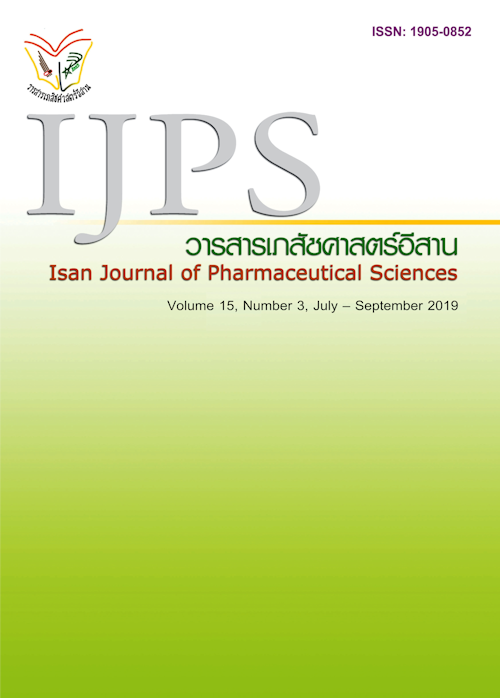Drug Relapse Therapy with Herbs
Main Article Content
Abstract
Drug addiction is categorized to be the key threats to health, economic, and social problem. So, herbal medicinal therapy for drug relapse might be considered as another potential option. Materials and Method: This Quasi-experimental Study was aimed to investigate risk factors of drug relapse, and the effect of herbal medicinal therapy in combination with the Matrix program. Seventy subjects with history of drug use were recruited and randomized into two groups (control and experimental groups; 35 each) during October 2017 - June 2018. Screening tests before and after herbal medicine therapy by V.2 and urine test were conducted. Data were analyzed by descriptive statistics, OR, 95% CI, T-Test and McNemar Test. Results: Most subjects (93.9%) were addicted to methamphetamine,63.6% of them had been rehabilitated, and imprisoned at 69.7%. Results of drug screening showed 54.3% of drug relapse. Among those, temporally drug users, drug users and drug addictions were counted for 15.7%, 77.1%, and 7.1%, respectively. Risk factors for repeated rehabilitation were family relationship, frequency of addiction, and social factor (p <0.05). The risk factors in drug relapse were smoking method, frequency of addiction, and peer group (p <0.05). Results of herbal medicinal therapy with the Matrix Program showed that the experimental group could reduce and quit drug addiction more than the control group (p <0.0001). Conclusion: Herbal detoxification could help reduce and quit drug addiction.
Article Details
In the case that some parts are used by others The author must Confirm that obtaining permission to use some of the original authors. And must attach evidence That the permission has been included
References
Becker ML, Kallewaard M, Caspers PWJ, Visser LE, Leufkens H, Stricker BHCh. Hospitalisations and emergency department visits due to drug–drug interactions: a literature review. Pharmacoepidemiology and drug safety. 2007; (16)6: 641-51.
Brook JS, Brook DW, Arencibia-Mireles O, Richter L, Whiteman M. Risk factors for adolescent marijuana use across cultures and across time. J Genet Psychol. 2001 Sep;162(3):357-74.
Department of Medical. Screening for drug. Nonthaburi: Department of Medical; 2017.
Harm Reduction International. The Global State of Harm reduction. London: Harm Reduction International; 2016.
Health Administration Division. Annual Report 2016. Bangkok: Health Administration Division; 2017.
Jenni B Teeters1,2 Cynthia L Lancaster1,2 Delisa G Brown3 Sudie E Back1,2. Substance use disorders in military veterans: prevalence and treatment challenges. Substance Abuse and Rehabilitation. 2017; (8) 69–77.
Kanato, M. Epidemic Situation of Ice. Bangkok: Charansanitwong Printing Co., Ltd.; 2012.
Kanato M, Leyatikul P, Choomwattana C, et al. ASEAN Drug Monitoring Report 2016. Bangkok: ASEAN Nacotics Cooperation Center; 2017.
Lu L, Liu Y, Zhu W, et al. Traditional Medicine in the Treatment of Drug Addiction. The American Journal of Drug and Alcohol Abuse. 2009; 35(1): 1-11.
Ministry of Public Health. Screening for drug. Nonthaburi: Ministry of Public Health; 2014.
Office of the Narcotics Control Board. Herb recipe. Bangkok: Office of the Narcotics Control Board; 2009.
Penglao Y, Phakdeekul W, and Kedthongma W. Situation and Associated Factor of Drinking, Smoking and Application of herbs in the Area of Nam Kam River,Thailand. Universal Academic Cluster International Spring Conference in Kyoto, April 17- 19, 2017. 113-19.
Phakdeekul W, Kedthongma W, Deela T, Srihata S, Lekla D, Wattanabu J. Therapy Model Integration for Drug Addiction with Herbs, The 1st Nontri International Conference : Kasetsart University, Chalermphrakiat Sakon Nakhon Province Campus,Thailand, November 26, 2017.180-85.
Phakdeekul W, Thongkrajai T, Eiamprapai P, Kanato M. Risk Factors to Alcohol Law Violations in the Community: Quasi-Experimental Study. American Journal of Applied Sciences, 2011; (12): 1343-48.
Phimarm W, Watcharachaipat T, Sungthong B, Caichompoo W, Saramunee K. A Systematic Review and Meta-analysis on Efficacy of Thunbergia laurifoliaL. In Pesticide Intoxication In Blood stream. Journal of Pharmaceutical Sciences, 2016; (11): 264-274.
Suwannanon A, et al. Personal Factors Related to be Relapse Drug Users. Bangkok: Office of the Narcotics Control Board; 2007.
Thepkhun N. The Efficiency of Thunbergia Laurifolia Tea for the detoxification of Drug Addicted patients Using Amphetamine in Thanyaruk Pattani Hospital. Pattani: Thanyaruk Pattani Hospital; 2014.
United Nations Office on Drugs and Crime. Annual Report 2015. Vienna: United Nations Office on Drugs and Crime; 2016.
World Health Organization. Harm reduction and brief interventions for ATS users. Technical Briefs on amphetamine-type stimulants (ARS), 2012; (1): 7-12.
Zhu W, Zhang Y,Huang Y, Lu L. Chinese Herbal Medicine for the Treatment of Drug Addiction. International Review of Neurobiology, 2017; (135): 279-95.


